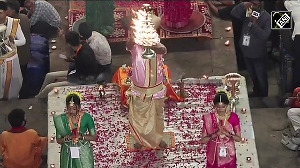Investigating agencies probing the Mumbai terror attack say that the men who carried out the mission worked on a need to know basis and hence they have not been able to elicit too much information from the only terrorist arrested alive during the attack.
An investigating officer told rediff.com that they need to piece together the information received during the interrogation. The officer says that is very clear that the men had trained in Pakistan and were operatives of the Lashkar-e-Tayiba. Another fact that has emerged is that the terrorist were specifically asked to target foreign nationals and Israelis in particular.
"A plan was drawn out and details about Nariman House was given to us and hence it was attacked," Ajmal Kamal, the terroroist in custody, revealed during the investigation.
Investigating agencies say that Kamal has said that training was imparted in batches in Karachi. They say they they need to collect a lot of information through forensics and other methods since the interrogation of just one man would not help the investigation completely. Kamal does not seem to know most of the names of the other members who participated in the attack. He just knows them by their code names and they are in Arabic. Moreover he has also revealed during the interrogation that they were specifically informed not to interact with the other teams. This method is used to ensure that investigators find it difficult to unravel the modus operandi thus making collection and corroboration of evidence extremely difficult.
Regarding local modules, the officer says that they are still trying to ascertain whether there were locals involved. They have tried asking the accused this several times, but he does not seem to have information on it. The IB says it is unlikely that local modules were used since it would mean that they would leave a trail for investigators. Moreover the Lashkar is highly unlikely to take the help of local modules since the Mumbai police had information on LeT sympathisers and associates in Mumbai.





